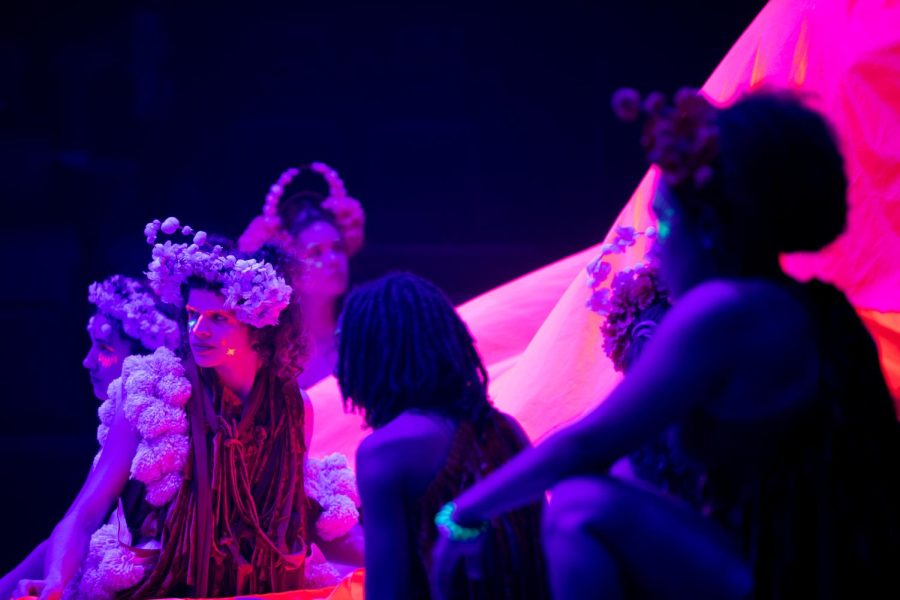Review | “The Bacchae: A Tragedy in One Act” presents humorous and humanist adaptation of classic Greek tale
On Nov. 4, “The Bacchae: A Tragedy in One Act” had its opening night at the David Thayer Theatre on the UI campus, presenting the humorous and humanist Kneehigh Theatre adaptation of the classic Greek tale developed by Euripides.
A dress rehearsal for the play Bacchae is seen the in the David Thayer Theater in the Theater Arts Building Wednesday, Nov. 2, 2022. The play will premiere on Friday Nov. 4.
November 5, 2022
Glowing beneath blue light swirling with stars and moons, giggling figures flitted across the stage in front of a mountainous backdrop inlaid with cliffs and caves.
The scene greeted audiences shortly after taking their seats in the David Thayer Theatre in the University of Iowa’s Theatre Building, Friday night. Relaxing into their refuge from the rainy weather outside, audiences didn’t know quite what to expect from the opening performance of “The Bacchae: A Tragedy in One Act” on Nov. 4.
Trickling onto the stage as the show began, each member of the Bacchae chorus wore a shade of pink, blue, purple, or yellow. Their costumes were loose and flowy, allowing them to embody a carefree whimsicality through their appearances. On their heads were perched intricate crowns of flowers and vines, signaling they were creatures of nature.
Handing out bracelets and flowers to audience members, the seven nymph-like Bacchae laughed with each other and started to dance. Movement was an essential aspect of this show, characterizing the Bacchae’s playfulness as well as their seductiveness. Movement also mimed their drinking of wine, as a tribute to the Greek god Dionysus.
This particular adaptation of the classic tragedy “The Bacchae” was first performed in the Kneehigh Theatre in England in 2004. It focuses more in-depth on the Bacchae themselves rather than the godliness of Dionysus, unlike some other adaptations.
Each Bacchae character had an individualized personality that drove their worship of Dionysus. He represented the romance, youth, or plethora of new experiences that they were deprived of, and they were unwaveringly faithful to him.
In one of the show’s most poignant scenes, the Bacchae sang about how their transformation freed them from lives as women constantly controlled by other people and their own insecurities. Becoming a Bacchae was like a reclamation of their bodies and souls.
RELATED: UI’s ‘Borderless: An All Black Affair’ showcased artists and celebrated Black culture
Their raw vulnerability and humanity were also revealed when they begged Dionysus not to abandon them as they had been abandoned before. In an endearing exchange, Dionysus comforted them and promised them that he would stay.
The original tale of “The Bacchae” was developed by Euripides. It is about the clash between the natural and the supernatural, reality and fantasy. In this context, Dionysus and the Bacchae believe in the fantastical side of life where inhibitions do not exist, while King Pentheus of Thebes adheres to the boundaries of what is real and known.
Throughout the play, the Bacchae were the most engaging and expressive characters. They behaved like Dionysus’s Greek chorus by repeating important points, responding emphatically to certain events, or providing exposition.
Towards the beginning of the show, they reenacted the birth of Dionysus with impressions of Zeus and Hera and a few sexual innuendos that had the audience clutching their sides with laughter. Such exposition helped develop the storyline in an entertaining way without dumping any of it in one long monologue.
Unlike a Greek chorus, however, the Bacchae participated as important facilitators of the story. They delivered Dionysus to King Pentheus and tempted Agave, leading ultimately to the shows infamous tragedy: the murder of King Pentheus at the hands of his own mother.
Dionysus, an unmerciful god, used the Bacchae to delude Agave into thinking she was slaying a lion when she was actually slaying her son. When she realized what she had done, she collapsed to the ground and released a heartbreaking scream.
The performance took on a modern twist with references to TikTok, and the use of rap as the musical style for one song. Most of the music consisted of ethereal synth beats or live instrumentals to produce atmospheric tension. The songs performed by the cast were layered with satisfying harmonies which echoed angelically in the theater through certain voice effects.
As only a one-act play, “The Bacchae” never felt rushed, even as it was ambitiously fitting such a complex story into a small time frame. Every scene flowed smoothly into the next. The cast adapted quickly to whichever setting in the story they were trying to inhabit and the Bacchae blended into every scene instead of constantly exiting and entering.
The incredible performances by every cast member, the emotive choreography, and the stunning sound and lighting choices definitely earned the production its standing ovation after its ominous ending when Dionysus glided offstage, his fiery cape floating on the wind behind him.




